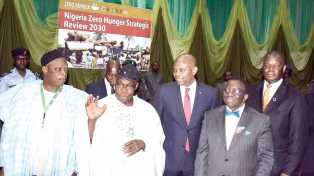
The Nigerian government has moved to achieve zero hunger by 2030 with the launch of a strategic plan and roadmap tagged:“Synthesis Report of the Nigeria Zero Hunger Strategic Review.” According to a report on The Guardian, the plan will end hunger, achieve food security, improve nutrition and promote sustainable growth. Launched in Abuja, last week, the plan reveals what the country needs to do to achieve Sustainable Development Goal 2 (SDG2) - one of the recently adopted global goals that seek to address the problems by 2030. Speaking at the launch, former president Olusegun Obasanjo, who chairs the development of the 60-page report, said it would support and encourage government to implement the policies, strategies, plans, and programmes that have been formulated over the years, and to do so with a focus on achieving Zero Hunger by 2030, if not earlier. Nigeria in 2015 endorsed a set of 17 SDGs, as part of efforts to tap its rich agricultural potential and lift over 13 million people from hunger, and to achieve sustainable development in general. Obasanjo said:“The launch of the report provides a framework that would unlock the potential of our nation and emancipate our dear country from the shackles of hunger and poverty.” He noted that the establishment of the Nigeria Zero Hunger Forum based at International Institute of Tropical Agriculture (IITA), would ensure that recommendations contained in the Synthesis Report and the individual Sub-committee reports are implemented. “We must do all we can so that this effort does not suffer the fate of previous endeavours,”he stressed. The ex-president commended President Muhammadu Buhari for endorsing the Nigeria Zero Hunger Strategic Review, as well as, the Executive Director of the World Food Programme (WFP), Ms Ertharin Cousin, for funding and requesting that the review be conducted, and gave special thanks to the African Development Bank (AfDB) for providing majority of the funds, which financed the review. On his part, Stanlake Samkange, director of policy and program of WFP, commended Nigeria for developing the strategic document but emphasised that the report was the first in West Africa and would be a guide for other countries to emulate. Samkange said that the task of ending hunger cannot be solved by a single organisation and lauded the collaborations of the different actors in the development of the report. The inauguration of the Synthesis Report will be backed with immediate implementation in four states-Benue, Ebonyi, Ogun and Sokoto, beginning this month. By January 2019, eight more states will be added and by January 2021, all the 36 states, plus Abuja, the Federal Capital Territory (FCT), will be included. Meanwhile, economic experts have disagreed with President Buhari that the 2017 Budget will take Nigeria out of recession, One of the experts say the president's optimism will be a ruse if adequate measures are not put in place by those in authority to ensure that Nigeria bounces back. According to him, here are six ways Nigeria can get out of recession in 2017. Source: NAIJ Posted on 15/01/17









Comments:
wow